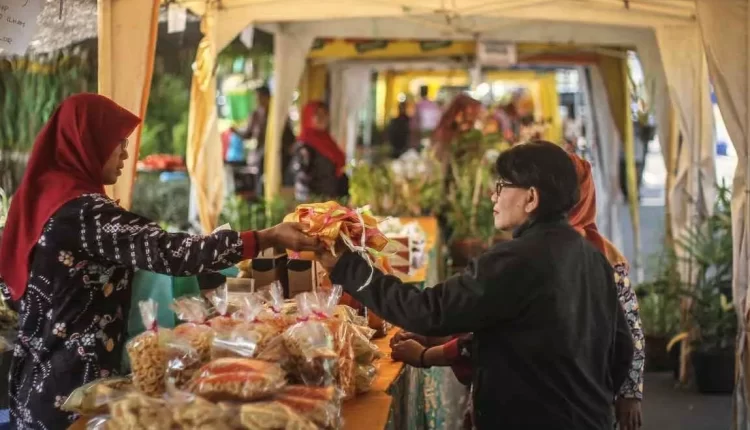Appreciating the Government Providing Stimulus for MSME Growth
By: Amalia S. Widjaja )*
The government continues to demonstrate its commitment to supporting the growth of micro, small, and medium enterprises (MSMEs) through various policies and economic stimuli. This effort is not only a response to the challenges faced by the MSME sector, but also a strategic step to strengthen national fiscal resilience and encourage MSMEs to move up a class.
Member of Commission VII of the Indonesian House of Representatives, Novita Hardini, said that the role of the government is very important in providing the right support for MSMEs. The main challenges for MSMEs include capital, production, marketing, and increasing the entrepreneurial spirit. Through the right support from the government, MSMEs can develop and make a significant contribution to regional economic growth.
Strengthening the supply chain network and implementing sustainable development principles are considered crucial steps to create a sustainable economy. On the other hand, developing the capacity of MSMEs requires improving the quality of human resources (HR), especially in mastering technology for product innovation, packaging, marketing, and management.
Meanwhile, Coordinating Minister for Economic Affairs Airlangga Hartarto said the government has prepared a comprehensive economic stimulus package to support various sectors, including MSMEs. This policy includes incentives in the form of tax exemptions and subsidies to ensure that MSMEs can survive and thrive amidst economic dynamics. The government has also prepared incentives in the form of an economic stimulus package to maintain public welfare and encourage growth in the business sector.
The stimulus package is designed to target six main aspects, namely households, workers, MSMEs, labor-intensive industries, electric and hybrid cars, and property. Specifically for MSMEs, the government has extended the validity period of the 0.5 percent final income tax until 2025 and provided an income tax exemption for MSMEs with a turnover of less than IDR 500 million per year. This policy is expected to ease the tax burden while increasing the competitiveness of small business actors. In addition, the government also provides a 5 percent interest subsidy for financing labor-intensive industries, including machine revitalization to increase productivity.
The government also designed a Food Assistance program and a 50 percent electricity discount during January-February 2025 to help low-income groups. This policy provides direct benefits to the community and also maintains overall economic stability. This effort shows the government’s commitment to creating a conducive and inclusive business environment.
Bank Permata economist Josua Pardede said the impact of the value added tax (VAT) adjustment of only 1 percent on the overall price of goods would be relatively small. Basic necessities such as rice, meat, vegetables, and milk remain exempt from VAT. Most of the VAT increase is applied to luxury goods, so it is not significant to the purchasing power of the majority of the community. Core inflation is projected to remain low due to price controls on food and strategic goods, as well as fiscal policies that support people’s purchasing power.
Incentives provided by the government, such as subsidies for basic necessities, social assistance, and tax reductions for MSMEs, are considered strategic steps that show support for the MSME sector and vulnerable community groups. The government has prepared various stimuli for MSMEs, including tax relief for small businesses, interest subsidies, and electricity discounts for low-income groups. All of these policies are designed to maintain people’s purchasing power while encouraging the growth of the MSME sector.
In a broader context, these government measures not only have an impact on strengthening the MSME sector but also on the stability of the national economy. Support for MSMEs reflects the importance of this sector as the backbone of the national economy. With a significant contribution to Gross Domestic Product (GDP) and job creation, MSMEs have great potential to become the main driver of economic growth in the future.
Collaboration between the government, business actors, and the community is the key to the success of MSME development. The government’s steps in providing stimulus that focuses on improving the quality of human resources and mastery of technology are worthy of appreciation. The importance of synergy between various parties to ensure that this policy can run effectively and provide sustainable positive impacts.
The success of economic stimulus policies depends not only on implementation, but also on public literacy in understanding the benefits of the policy. The government’s efforts in supporting MSMEs must be appreciated as a form of commitment to creating an inclusive and sustainable economy.
In the future, it is hoped that this economic stimulus policy can continue to be strengthened and refined. Continuous support for the MSME sector will increase competitiveness and strengthen national economic resilience, making Indonesia one of the new economic powers in the world. Through this policy, the government has shown a real commitment to providing solutions to the challenges faced by MSMEs.
This pro-MSME economic stimulus policy is real proof that the government not only cares about small business actors but also understands the importance of this sector as the main foundation in building an inclusive and sustainable economy.
)* Economic observer, Fadjar Surya Institute.
